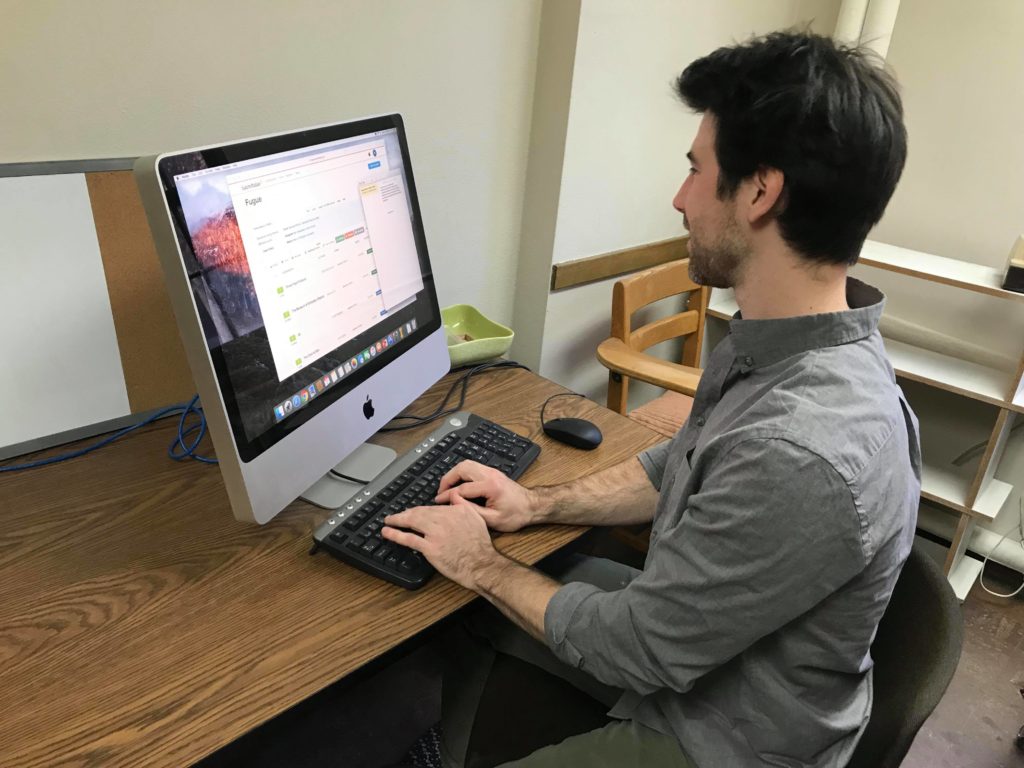During his undergraduate at Northern Michigan University, second year Master of Fine Arts candidate in fiction, Scott Dorsch, did not know what he wanted to do.
After taking a hiatus and working as a farmer, Dorsch was able to discover he could pursue his passion of writing as a career. He finished his undergraduate with a degree in English writing with an emphasis in creative writing.
Dorsch said he always wanted to write and farming allowed him the time and headspace to do that while away from school.
“It didn’t really occur to me that I could do this (writing) as a career until I went back,” Dorsch said.
Dorsch said his mentor and friend John Billman inspired him to pursue writing as a career. Billman teaches fiction, magazine journalism and creative nonfiction at Northern Michigan University. Billman allowed him to take a 400-level fiction class, despite him not haven taken any lower level fiction classes. While taking that class, he discovered that writing is what he wanted to do as a career.
“I think John in a big way was what gave me the, I guess, the permission to move towards it as a career choice,” Dorsch said.
ICYMI: UI graduate student builds prosthetic for friend
Dorsch has had his work published in Midwestern Gothic, a literary magazine based in Ann Arbor, Mich. and Chicago. The magazine publishes fiction, essays and poetry.
Dorsch has also been awarded the Legler Memorial Poetry Prize and the VandeZande Fiction Award from Northern Michigan University. Dorsch also is a recipient of the 2019 Writing in the Wild Fellowship from the University of Idaho.
Dorsch decided to come to UI for his graduate degree because of the location and because of the way the program is set up.
The MFA in Creative Writing at UI is a three-year program that focuses on workshops and technique classes. Students in the program can choose between three genres as their emphasis: poetry, creative nonfiction and fiction. Upon completion, students can teach if they choose to do so.
The MFA program at UI also offers full tuition waivers and stipends to all MFA students who participate in teaching assistantships; meaning they have to teach three classes a year.
“I was looking far and wide for an MFA that also fit my life trajectory with writing,” Dorsch said. “To me writing is, only 50% of it, is sitting down in the chair and writing and the other 50% is living the life you want to lead. But also, what you want your characters to eventually lead to and etcetera. And I felt like Idaho was a good place to do that.”
Some of the professors at UI Dorsch said he admires for their writing and the lives they lead are Kim Barnes and Daniel Orozco. Barnes teaches creative nonfiction writing and fiction writing. Orozco teaches fiction writing.
Another aspect of the MFA program at UI Dorsch enjoys is students can take workshops outside of their chosen genre. He also likes the large emphasis in literature theory and other aspects of literature. MFA students have to take five of those classes during their time at UI.
The structure of the program and the classes UI offers these students is not the only thing Dorsch enjoys about the program. Dorsch said the environment between students is not competitive, it’s more collaborative in his opinion compared to other MFA programs.
“It seems a lot in this community that a win for one person is a win for everybody,” Dorsch said.
ICYMI: UI Ph.D. candidate featured in radio program

Nicole Hindberg | Argonaut
Dorsch is also the fiction editor for Fugue, the literary magazine on campus. Dorsch has been working with Fugue for almost a year and began working as the fiction editor this school year.
Undergraduate and graduate students can work at Fugue, but graduate students manage and edit the magazine.
Dorsch said working at Fugue gives him the opportunity to see how a publication process works for literary magazines. Even though the process is slightly different from larger publications, the processes are fairly similar.
“For people that are interested in this work at all, even on a hobby base level, (the magazine) is such a great way to peek in the door and see how this whole thing works,” Dorsch said.
Dorsch said he is unsure what he wants to do exactly after graduate school. He is looking for ways to further his career as an author, but he is also considering teaching after his degree.
“Even though teaching was really difficult the first year that I did it, because it was the first time and you get thrown in. But since then I’ve come to really appreciate it,” Dorsch said. “It’s a cool option to have, I think a lot of us would say that our main goal is to be an author, a poet or whatever. But I think that I’m starting to see that education is a big part of that and can continue to be a big part of that. So I’m not writing it off, no pun intended.”
Nicole Hindberg can be reached at [email protected] or on Twitter @HindbergNicole.
